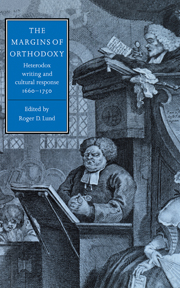Book contents
- Frontmatter
- Contents
- List of contributors
- Acknowledgments
- Introduction
- PART I THE IDEOLOGY AND ORIGINS OF HETERODOXY
- PART II LOCKE AND HETERODOX OPINION
- 3 Anticlericalism and authority in Lockean political thought
- 4 John Locke: conservative radical
- PART III POLICING THE MARGINS
- PART IV ORTHODOX DEFENSES, HETERODOX RESULTS
- Select bibliography
- Index
3 - Anticlericalism and authority in Lockean political thought
Published online by Cambridge University Press: 09 October 2009
- Frontmatter
- Contents
- List of contributors
- Acknowledgments
- Introduction
- PART I THE IDEOLOGY AND ORIGINS OF HETERODOXY
- PART II LOCKE AND HETERODOX OPINION
- 3 Anticlericalism and authority in Lockean political thought
- 4 John Locke: conservative radical
- PART III POLICING THE MARGINS
- PART IV ORTHODOX DEFENSES, HETERODOX RESULTS
- Select bibliography
- Index
Summary
In this chapter I want to consider the problem of anticlericalism and ask, what does an understanding of that perspective contribute to our appreciation of Locke's conception of authority and the role played by that concept in his political thought, viewed as a whole? Anticlericalism is an understudied subject both with reference to the secondary literature on Locke and more generally as an aspect of the social consciousness of individuals living in seventeenth-century England. Such studies of anticlericalism as do exist have generally placed it within the political context of civic humanism, a paradigmatic framework that has become notorious for its exclusion of Locke and Lockean concepts. Alternatively, when Locke's religious ideas are discussed they are placed within an intellectual context divorced from anticlericalism, where the preoccupation of interpreters lies in determining whether Locke was a Socinian or a deist or whether he should be aligned, intellectually, with the Dissenters or the Anglican Latitudinarians.
Finally, of course, anticlericalism has most often been viewed as part of a larger process of secularization and an adjunct to the growth of a commitment to reason, science, and the emergence of modern society during the last half of the seventeenth century. This perspective has also served as an interpretive framework for Locke's political thought, so that, for an older generation of scholars, Locke was honored as the first secular political theorist of the modern age.
All of these presuppositions and categories, I shall argue, are inadequate not only in terms of understanding Locke's thought, but also as axes from which to view certain features of modern society.
- Type
- Chapter
- Information
- The Margins of OrthodoxyHeterodox Writing and Cultural Response, 1660–1750, pp. 73 - 96Publisher: Cambridge University PressPrint publication year: 1995
- 3
- Cited by



